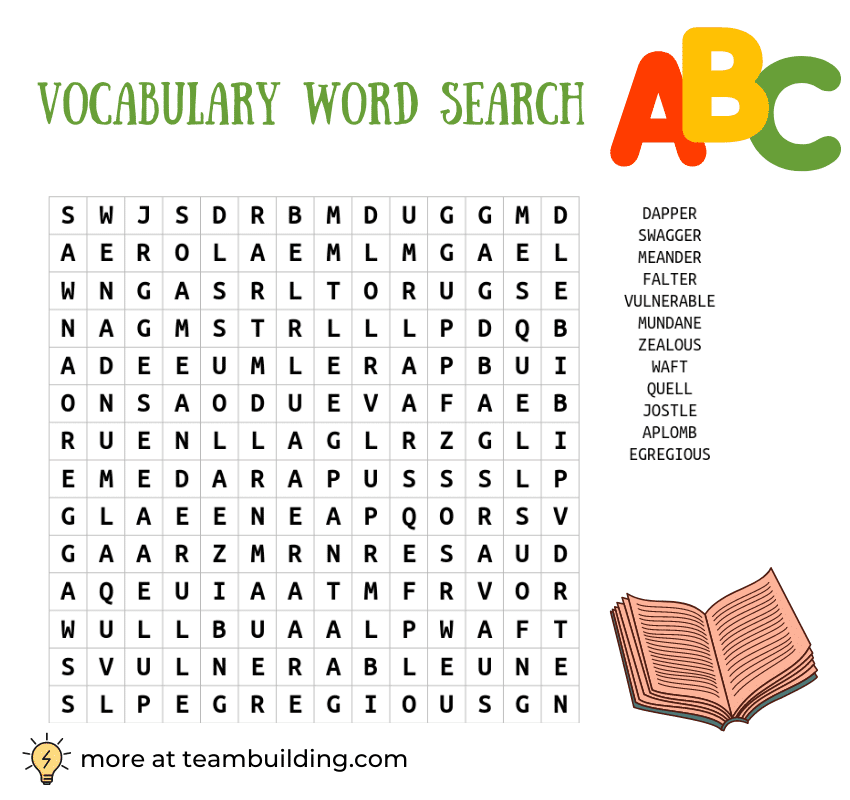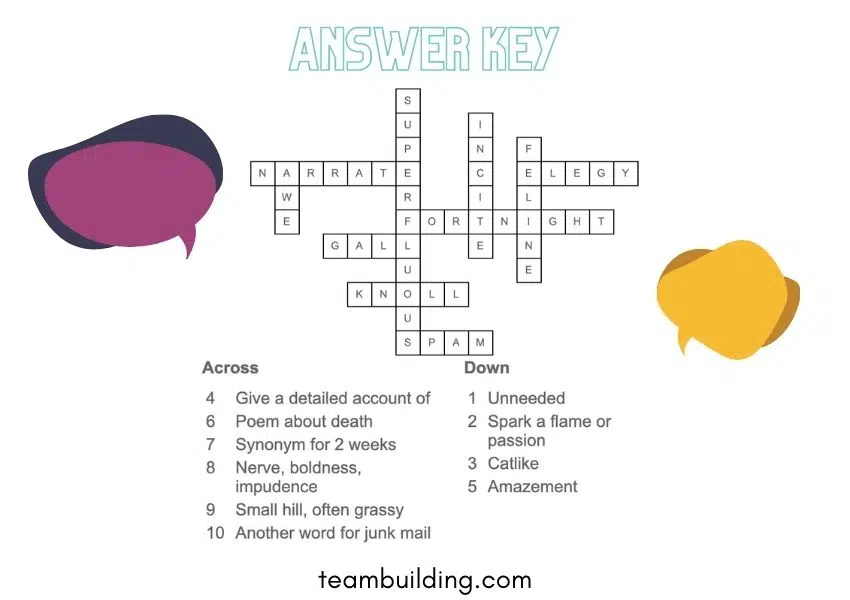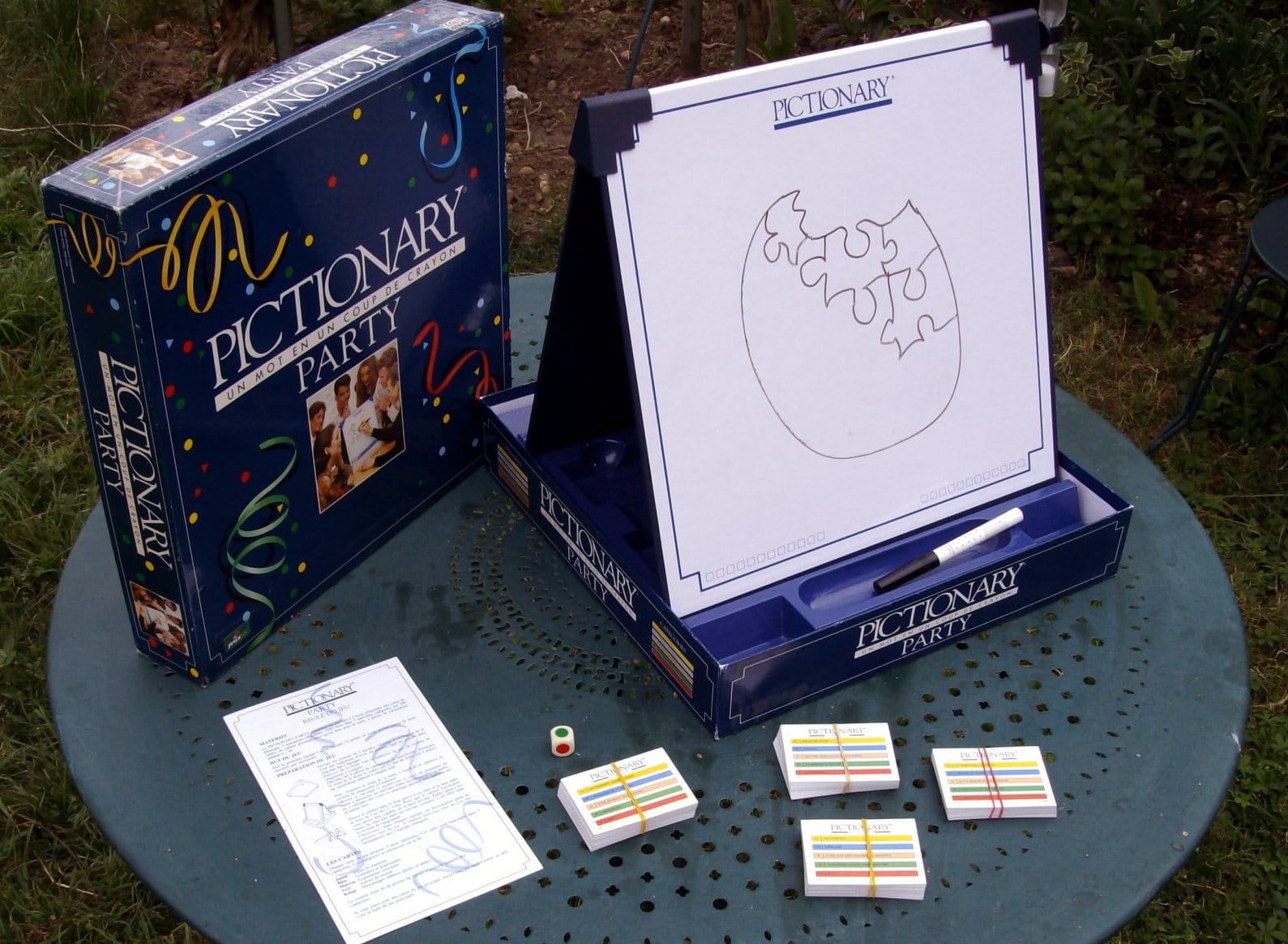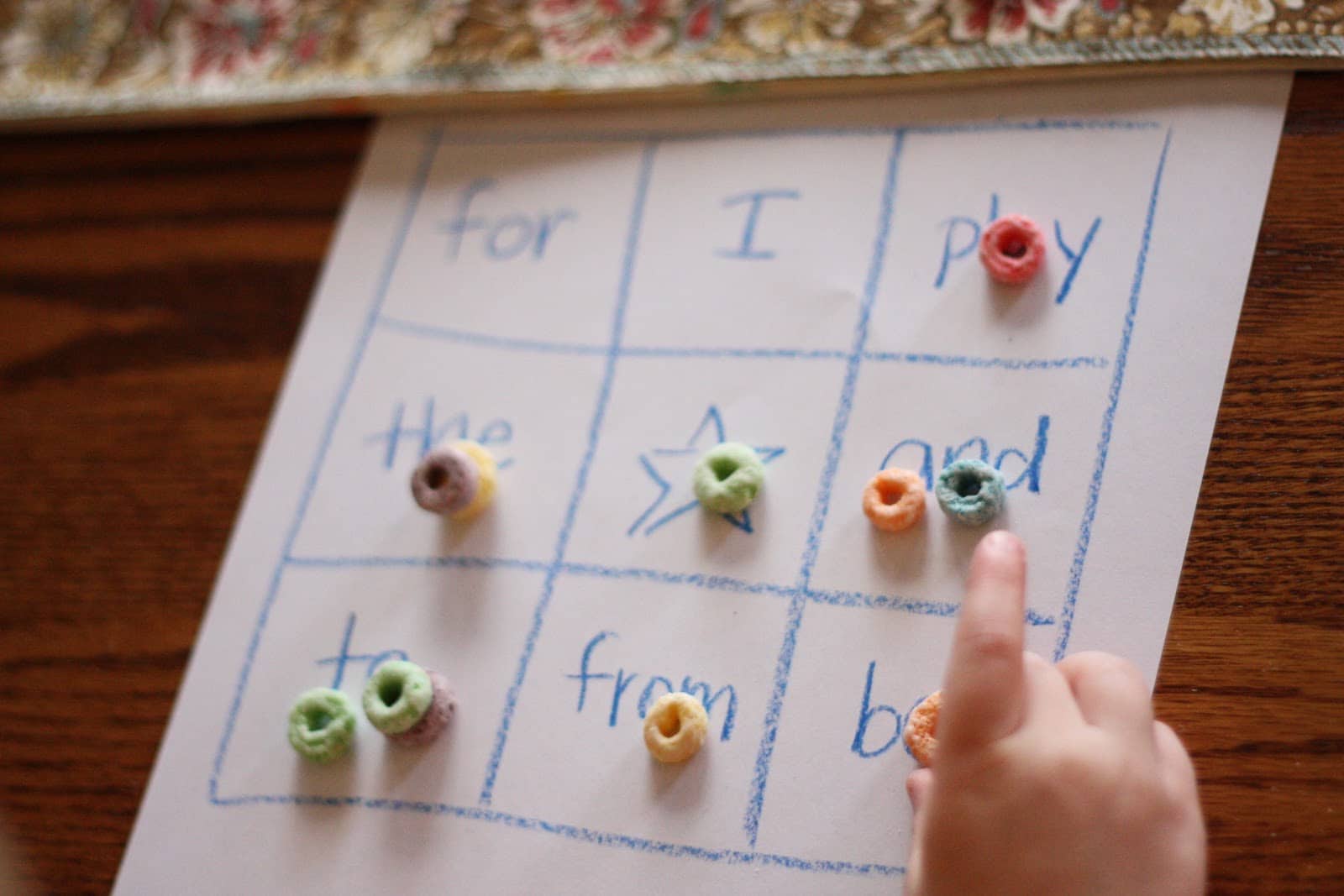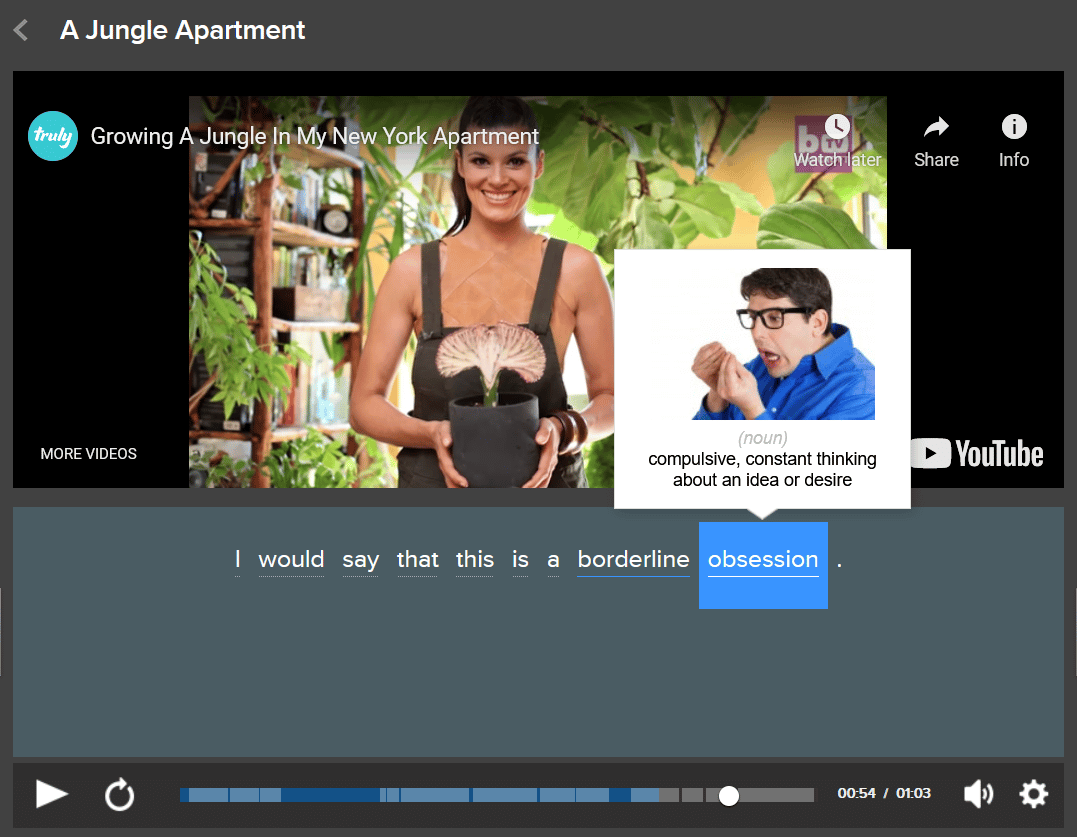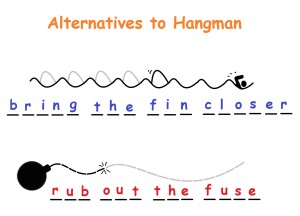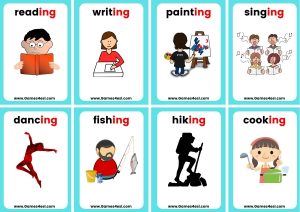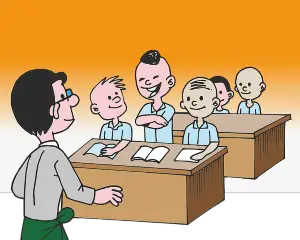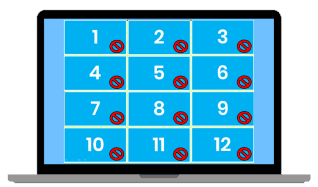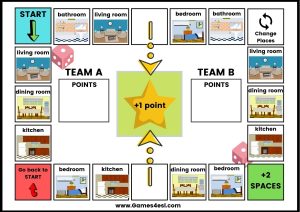The acquisition of new vocabulary is essential in terms of overall language advancement. However, there is always a need to review active words from time to time in order to use them fluently in speech. Here, we will present a couple of great vocabulary revision games which will perk up every classroom. Through these games the learners will feel how fun, entertaining and effective the learning process can be.
1. Charades
Charades is a fun and cool revision game. Students need to practice their acting skills to explain the words. This game is extremely easy to organize with minimal advance preparation. The only thing to be ready for is to keep a collection of vocabulary cards for the words you have studied.
The class is divided into two teams. Each team member takes turns acting out one of the words from the vocabulary set and explains it by acting out the word. If his or her own team can’t guess the word, the opposite team gets the chance to guess it. Each right answer equals one point.
Skyeng ищет преподавателей английского. Подробности по ссылке: Skyeng
2. Pictionary
Pictionary is also an entertaining game to play for vocabulary review. The rules are similar to those of charades except that instead of acting out the word, it is drawn on the board.
3. Bingo
Bingo can serve as a good revision game. From my experience, most of the groups/students like playing bingo because it gives them the chance to reflect on the words they have digested.
Students are given a blank bingo board and are asked to put the review words into the squares randomly. The teacher puts the active words in a hat or a box, takes them out one by one and defines them. If the student has a word corresponding to the definition, he crosses it out on his bingo board. When someone gets five squares in a row, they should shout, “Bingo!”
Check these articles out as well:
4. A memory style
A memory style card game can be another effective way for reviewing vocabulary. It requires some preparation before the game starts. For each word to be reviewed, one card should have the target vocabulary word and another card should have the definition of the word. You also need to have a big playing grid where you put the words and their definitions face down.
Each person turns over two cards each turn trying to find a match. If the cards do not match, he turns them over again and the next person tries to find a match. If he succeeds, he keeps the cards and gets an additional turn. The player with the highest number of cards at the end of the game wins.
The game can be modified even further. If you have accumulated enough synonyms or antonyms to the target vocabulary, you can practice matching target words to their antonyms or synonyms.
5. Categories
Categories is another awesome revision game which will make students energized and empowered. What they need for the game is to draw 4-6 columns on their paper and write a category at the top of each column. Categories fit the topics covered during the course. For example, if you have covered the business topics of Marketing, Work and Leisure, Ethics, Human Resources, Travel, you write these topics as categories.
You time the students and ask them to write as many words as possible under each category. As a further modification, choose a random letter and write it on the board. Give students enough time to write down a word for each category that starts with that letter.
Экономьте время на подготовку к урокам и проверку домашних заданий со Skyeng. Удаленный формат занятий, защита от внезапных отмен и график, который настроен специально под вас. Присоединяйтесь к нашей команде. Подробности по ссылке: Skyeng
6. Letter scramble
Letter scramble will make students really competitive and super fast. What you need is to take a list of words that your students have recently learned and write a scrambled version of each on the board. Students need to unscramble the words on their paper. The first one to finish deciphering all the words wins.
7. Stop the bus
Stop the bus is a cool game my students adore. I usually divide the class into 2-3 teams. One student from each team. This student sits on a chair facing his peers. Then from behind the student in the hot seat, show the other students a word from the lesson. The other students must try to describe what the word is without saying the actual word. And the student in the hot seat must guess.
The student who guesses the word shouts out “stop the bus” and checks the word with the teacher. If correct, the team gets a point. If wrong, other teams have the chance to guess the word by writing their versions on a piece of paper and passing the papers to the teacher.
8. Puzzles
Puzzles is another cool and easy tool to review the material in an effective way. What I like about this way of vocabulary revision is that students can work in pairs or groups while trying to find words matching the definition in the crosswords. They learn by listening to each other, cooperating to find the right answer. In this way, they both review the material and improve their teamwork skills.
Follow this link to get templates of different types of puzzles.
We also recommend watching a video with Alexei Konobeev. The speaker shared games to help your students remember new vocabulary. These games do not require special training and you can adapt them to any age and level.
We hope that all these games would serve their best to liven your vocabulary revision sessions and make them more meaningful and effective.
Which of these games have you tried? Which ones have you picked up for your next revision slot?
You found our list of fun and simple vocabulary games for adults.
Vocabulary games are activities that include language and wordplay. Example games include Word Association and Hang Man. Players can enjoy vocabulary games in person or online. The purpose of these games is to strengthen vocabulary skills. These games are also known as “vocab games”, “letter games” and “vocabulary building games.”
These games make great online classroom activities and communication games, and can be used as online fun activities for employees.
This list includes:
- vocabulary games for adults
- simple vocabulary word games for adults
- fun online vocabulary games and activities
- English vocabulary games
- vocabulary games in English
- games to improve vocabulary
- vocabulary building activities
- vocab review games
- vocabulary games for students
Get ready to play!
List of vocabulary games
From Pictionary to word scrambles to synonym memory, here is a list of fun word games to play in classrooms, at parties, or during meetings.
1. Vocabulary Pictionary
Pictionary is a game of charades where players draw words instead of acting them out.
To play:
- Split the group into teams.
- Each round, assign one team member to draw.
- Give the drawing team member a word.
- Allow up to sixty seconds for teammates to guess.
- If the team guesses correctly, then assign one point.
You can give other teams the opportunity to steal, or move onto the next team’s turn. The game is a great way to practice new vocabulary, as players connect the word with an image. Pictionary is a fun game for virtual parties or in-person affairs.
To play Pictionary online, draw on the whiteboard app feature on your online meeting software.
2. Word Association
Word Association is one of the best vocabulary games for kids and classrooms since playing does not require a large vocabulary. The rules are simple and easy to understand. Typically, the game involves two players.
To play:
- Player one says a word.
- Player two responds with the first word that comes to mind.
- Player one either chooses a new word or responds to player two’s word.
- The game continues until one player repeats a word or pauses too long.
The rapid pace of the game generates excitement and occasionally results in funny answers.
If a student makes a mistake, then the teacher can pause the game and ask the student to explain or find a more fitting word. Ideally, gamemasters should allow players a few extra seconds to respond. Players should never feel embarrassed. There are no wrong answers in word association, but the game can serve as a learning opportunity to find better words.
If playing via Zoom, then player one or the teacher speaks a word, and other students answer in the chat. The class counts up matching answers and discusses different responses, guessing the reasoning behind each answer.
3. Vocabulary Hangman
Hangman is a classic chalkboard word game that translates easily to online play, thanks to digital whiteboards.
To play:
- Assign a player a word.
- The player draws a series of blanks corresponding to the number of letters in the word.
- Other players guess letters.
- If the letter is in the word, then the “executioner” fills in the blank. If not, then the executioner draws one portion of the gallows.
- The game ends when players guess the word, or when the picture is complete.
The best words to use for hangman contain less-used letters like z, x, and q. Examples of hard hangman words include zigzagging, razzmatazz, and quadrants.
4. Word search
Word searches are common classroom vocabulary games. These activities work well for handouts, and you can play during video calls by using the whiteboard feature and enabling annotation.
We made a sample word search you can use.
To make the game more competitive and exciting, turn the challenge into a race and award prizes to the first players to complete the puzzles.
5. Crossword
Crossword puzzles consist of a series of interconnecting boxes, each of which starts blank but contains one letter by the end of the game. Under the puzzle are two lists of clues, across and down respectively. Solvers need to consider the meaning of words, number of letters, and surrounding words, making the game strategic as well as literary.
Here is an example of a crossword puzzle you can use with your class or team.
Here is the answer key.
Crosswords are great word games for any age or skill level because puzzle makers can adjust the difficulty to suit players. To make your own crossword puzzle, use an online crossword creator.
6. Word Scramble
Word scrambles make great games for English class, and adults enjoy these language brain teasers as well. Simply mix up the order of the letters and ask players to unscramble and identify the original words.
Here is a sample to start with.
And here is the answer key.
To make your own word scrambles, use an online letter randomizer.
7. Scrabble
Scrabble is one of the most popular word games for adults or children. Players must use letter tiles to assemble words on the game board.
To play:
- Each player draws seven letter tiles.
- During turns, players can play tiles or exchange them for new letters.
- Players build words on the board, with each new word connecting to an existing word.
- Tiles have a point value assigned depending on the challenge of the letter. When a player makes a word, tally the letter and add the score to the point board.
More challenging letters have higher point values. For example, E is one point, while Z is ten. To find the point values for each tile and read more gameplay tips, check out this guide from Hasbro.
To coordinate the game for language lessons, assign higher scores for vocabulary words, and ask players to use the words in a sentence for extra points.
Scrabble is easy to play online, too, making it one of the best online vocabulary games. To play virtually, simply find a multiplayer online version of the game, such as Words With Friends.
8. Scattergories
Scattergories is one of the most fun and simple word games for adults. The game challenges players to think up words all starting with the same letter.
To play:
- One player rolls a letter die or uses a letter generator to pick the first letter.
- The timekeeper puts 60 seconds on the clock.
- Players write down one answer per category starting with the letter.
- When time runs out, players read the answers.
- Players receive a point for every answer.
Alliterative phrases count for double or triple points. If two players have the same answer, then they must cross it out and neither receives points. Of course, a player will not receive points for blank answers either. At the end of each round, the player with the most points wins.
Here is a list of sample Scattergories categories:
- A boy’s name, girl’s name, or gender neutral name
- Capital cities
- Four letter words
- Types of drinks
- Holidays
- Careers or professions
- Cartoon characters
- Websites
- Desserts
You could create more inventive categories for the game, or challenge players to make up prompts.
To play virtually, use the chat, screen-share, whiteboard functions in your virtual meeting platform. You can also share a Google Doc or Form, or join a multiplayer online Scattergories game together.
9. Tree or Bob Ross
Tree or Bob Ross is a fun video conference game that challenges players to guess a word by asking questions.
The player who conjures the word is The Post. The Post answers This or That questions whose answers help players narrow down the word.
The first question of the game is usually “is it more like a tree, or more like Bob Ross?” and The Post must answer accordingly. For instance, a rose is probably more like a tree, but Pinnochio presents an interesting challenge.
Each turn, the guesser adds a new word. For example, the second question might be, “is it more like a tree or a fern?” The game continues until players guess correctly. For more excitement, introduce a time limit, or award more points if players guess the word during earlier rounds.
10. Vocabulary Pyramid
Pyramid challenges players to guess words from context clues. The pyramid is a collection of six words, arranged with three on the bottom, two in the middle, and one at the top. To win, teams must guess all words within the pyramid in the allotted time.
To play:
- Divide the group into teams.
- Give one player on each team the pyramid.
- The pyramid holder must give hints to teammates describing each word without using the actual name of the item.
- When players guess correctly, the pyramid master can move to the next word. Or, players can say “pass,” and return to the word later.
- Teams receive a point for every correct guess.
When determining the time limit, consider the age of your players and the difficulty of the words. In general, 30 seconds per word, or three minutes total, is a good place to start, but add or take away time to increase or decrease the challenge.
11. Invisible Bridge
Invisible Bridge is similar to six degrees of Kevin Bacon. In both games, you must figure out a way to connect two seemingly distant concepts. Six degrees of Kevin Bacon uses actors, while Invisible Bridge uses words.
To play:
- A player suggests two unrelated words.
- Player one gives a number of planks. This is how many steps other players must use to relate the two words.
- The other players think up words that share similar traits, synonyms, or connector words to move from one term to another.
An example round might look as follows:
Tiger, Astronaut, eight planks
Tiger – Balm – Lip – Service – Customer – Happy – Pills – Capsules – Space – Astronaut
Meanwhile, Tiger, Astronaut, two planks might look like this:
Tiger – meat eater – meteor – Astronaut
One fun aspect about this game is there can be more than one correct answer, and opposing teams can dispute far-reaches. Invisible bridge encourages players to think about the nature of language and the relationship between words.
12. Poetry Improv
Poetry Improv is an exercise that challenges participants to craft verses on the spot.
To play:
- Pick a poetry style, such as sonnet, haiku, acrostic, limerick, or free verse.
- Give participants vocabulary words to use within the poem.
- Allow five or ten minutes for groups or individuals to complete the verses. If playing online via meeting software, then send groups to breakout rooms to work.
- Ask poets to share the masterpieces aloud.
For extra fun, turn other players into judges by asking them to rate the poems by holding up scorecards. To make the game more fast-paced, ask players to finish each others’ phrases on the spot for a true poetic improv.
13. Synonym Memory
The rules of Memory are easy: flip over two cards at a time and look for matching pictures or words. When players find pairs, they take the cards off the board. The player with the most pairs of cards at the end of the game wins.
Synonym Memory puts a challenging spin on the simple game. Instead of hunting for exact matches, players pair up words with synonyms.
Here are some sample matches:
- enticing/tempting
- assume/suppose
- patience/restraint
- revoke/rescind
- impact/collision
The game encourages players to think in different ways, as participants will need to remember the location of the cards as well as consider meanings of words.
To play online, make your own virtual synonym memory game with an online tool and share screens to play, with one player flipping over the cards at other players’ request.
List of words to use for vocabulary games
Here is a list of great words to use in word games:
- serendipity
- fortitude
- akimbo
- sumptuous
- ineffable
- zephyr
- incorrigible
- medallion
- mauve
- bombast
- denouement
- contemporary
- gossamer
- inane
- hippodrome
- concession
- ideology
- quintessential
- prescient
- regurgitate
- gnash
- cataclysmic
- knell
For further inspiration, use a random word generator or consult online lists of difficult or intersecting words.
Conclusion
Vocabulary games and activities test and strengthen players’ communication skills. These word games minimize frustration by disguising language lessons in the form of an exciting challenge. Not to mention, simple word games are fun for adults and kids alike, and make great icebreaker activities during meetings. Most games only require words and a way to share them, so playing word games online via Zoom or similar platforms is easy.
For even more smart fun, check out our posts on problem solving games, question games and team building brain teasers.
FAQ: Vocabulary Games
Here are answers to common questions about vocabulary games and activities.
What are vocabulary games?
Vocabulary games are word and language games you can play with students, coworkers, or family and friends. These games challenge players to hunt for words or definitions, brainstorm terms, deduce phrases based on clues, or create words under certain conditions. Language games are a great way to teach new vocabulary and help students practice recognizing and using new words. These activities are also known as “vocabulary building games” and “vocab games”, and are similar to “word games” and “letter games”.
What are some fun word games for groups?
Some fun word games for groups include Pictionary, Tree or Bob Ross, and word scrambles.
What are some online vocabulary games?
By using virtual meeting software like Zoom, you can play any word game online. Some good virtual vocabulary games include Scrabble, Scattergories, and online crossword puzzles.
What are good ESL word games?
The best ESL word games are easy to understand and play yet expand the vocabularies of participants. Good ESL word games include word association, word searches, and hangman.
What are fun ways to teach vocabulary?
Word games are one of the most fun and easy ways to teach vocabulary. While some kids get frustrated with straightforward reading or language exercises, word games disguise vocabulary lessons as a fun challenge. Plus, playing language games together is a great teamwork exercise.

By
Last updated:
July 19, 2022
Trying to teach a group of intermediate students ain’t easy.
At this level, rehashing the basics is a bore and introducing more advanced topics can result in frustration.
Tired of seeing only two or three students actually paying attention in your class?
It’s amazing what a difference a few fun games can make!
Things like building vocabulary are an essential part of learning English, but they can be dull. Spice up the classroom with some of these ESL vocabulary games to enhance the learning experience.
Download:
This blog post is available as a convenient and portable PDF that you
can take anywhere.
Click here to get a copy. (Download)
10 ESL Vocabulary Games That Will Get Your Students Engaged
1. Last Man Standing
This game is fast-paced, but allows students some time to think. It also encourages peer learning, as students will pick up on words they hear others speaking. To play the game, grab a ball and have all the students form a circle. Name a category or theme, such as things found in a kitchen, food, professions, and so on.
Begin by tossing the ball at a student. That student will shout a word related to the theme and throw the ball to another student. As each person catches the ball, they need to come up with another word that fits the theme. If they repeat a word that has already been said or can’t think of a new one within a few seconds, they are out and must sit on the sidelines. Don’t worry, they’ll still be learning!
Take things up a notch with a different version of “Last Man Standing.” Instead of naming a theme, each student gives the next student another theme. For example, you might start off with “something red.” The first student to catch the ball could say “strawberry” and then choose another topic and throw the ball to the next student. This makes the game much more difficult, since students cannot think of a word until they know what their theme is.
2. Pictionary
Most English speakers are familiar with Pictionary, the drawing game. You can use the cards from the actual board game to create a classroom activity that will thrill your students. This is a good, high action game that students really get into.
Chalkboard Pictionary. To play in a classroom with many students, it’s not very practical to use the game board. This means you’ll be using the chalkboard or whiteboard at the front of the room.
Divide the class into two teams and create a small column for each team on one side of the board. You’ll record their points here. Have one person from Team A come up to the front. Have the student draw a card (try using Pictionary Junior cards if the adult ones are too advanced for your class). Alternatively, you can write words on slips of paper for students to choose.
The student must convey the word to his or her team using only drawings. Students cannot use words, symbols or hand gestures. Limit the time to three minutes maximum. Each correct word is a point and the first team to get 10 points is the winning team.
3. Charades
Charades is quite similar to Pictionary, but it uses actions to communicate the secret word in place of photos. This is a great game for those days when your class is dragging and people are falling asleep. Get them up and get them moving!
Write down words on slips of paper for students to choose. Verbs are likely to be the easiest, but you can also use more complicated words, provided you are sure most of the students know them.
Divide the class into two teams and have one person from each team choose a piece of paper and act out the word. The teams must guess the correct word before three minutes run out. For each correct word, that team receives a point. The team that hits ten points first is the winning team.
4. Taboo Words
Taboo Words helps students practice with synonyms and descriptions. Separate the class in half and have the two teams sit on opposite sides of the room, facing each other. Each team will choose a person to sit in front of their team, facing them in the “hot seat.” You will stand behind the students and hold up a piece of paper with a word on it. The students in the hot seats will not be able to see these papers.
Teams have three minutes (or any amount of time you want to set) to get their hot seat member to say the word on the paper. The catch is, they can’t say the word under any circumstances.
Tips for playing in a large class. If you have more than 12 students in a class, things can get a little chaotic with this game. In this case, it’s usually simpler to divide everyone into teams of 5-6 people and have only one team go at a time.
5. 20 Objects
Test your students’ memories and vocabulary at the same time with this fun game. All you need is a clear desk and 20 common items from around the classroom. You can even grab things from your backpack or purse.
Arrange the objects on the desk and let students gather around to look at them. Cover everything with a sheet (or something similar) after one minute and send everyone back to their seats. Each students should write out as many items as they can remember on a piece of paper, all in English.
When everyone is done, write a list of the items on the chalkboard and allow students to self-correct. Alternatively, you can call out the objects and give a point for each one that is correctly written.
6. Categories
Students will beg to play this game once they get the hang of it! It’s a great way to fill up the last few minutes of class, too.
Have students draw six columns on their paper and write a category at the top of each column. You can choose categories that fit what you’ve been studying in class or go with some basics. Popular categories include food, names, cities or countries, furniture, verbs and clothing.
Choose a random letter and write it on the board. Give students enough time to write down a word for each category that starts with that letter. You can repeat with new letters as many times as you like.
7. Letter Scramble
Take a list of words that your students have recently learned and write a scrambled version of each on the board. Allow students to unscramble the words on their paper. The first one to finish deciphering all the words wins.
8. Chalkboard Acronym
Write a word vertically on the board and then have students come up, one at a time, to write a word starting with each letter of the vertical word. For example:
Cute
Under
Porcelain
Make this tougher by requiring the words to be related to the acronym.
9. What Am I Thinking Of?
If you’ve ever played 20 Questions, you already know how this game goes. To make it a little easier on your students, however, you’re going to include some visual clues.
Pair students up and have them think of an object. Each student should write 5-10 words describing the object on a piece of paper. When you call time, the students swap papers and try to figure out what the other person described. The first team to have both words guessed correctly wins.
10. Word Bingo
You’ll need to do a little preparation for this game, but it’s well worth it. Make bingo sheets with a 4×4 grid and add words to each square. Hand these out (each one should be unique) and have students mark the correct word when you call it out. The first person to finish marking their entire page wins.
There are some fun variations to Word Bingo!
Picture Bingo: Use pictures on the Bingo card and call out the words that relate.
Synonym Bingo: Get those brains working by giving students a word that means the same thing as a word on their card.
Antonym Bingo: This is just as it sounds. Call out the antonyms of words on their cards and see how many students get it.
Video Bingo: Instead of calling out individual words, make the game more challenging by playing a video that has the words on students’ bingo cards. This will encourage students to listen closely and provide a more natural way to practice.
You can use FluentU for this variation of the Bingo game, since the program has a few features that’ll make prep easier for you.
FluentU has many videos created for native English speakers like movie trailers and inspirational talks. You can find videos that use specific words just by searching for the word you want to include. Each video also has a key word list before you play it, which you can use to populate your Bingo boards.
You can even assign a variation of this to students for homework: You can import all the words students are learning into flashcard decks that students can then study with personalized quizzes. Or, you can ask students to pick a video and add five new vocabulary words to their flashcard list as they watch—to do this, they just have to click on any word in the subtitles then click to add the word to their words.
10 ESL Vocabulary Games to Get Your Students Seriously Engaged
ESL vocabulary games make class time a little more exciting. You can use them to review previously learned words, but keep in mind that games also make great rewards for when your students do well in class.
Download:
This blog post is available as a convenient and portable PDF that you
can take anywhere.
Click here to get a copy. (Download)

***Call my Bluff***
If you want to challenge your advanced learners, get them into teams to play this competitive word game based on a popular old-time British quiz show. Give each team a set of dictionaries and a list of words, making sure to choose vocabulary that is useful but unlikely to be familiar. Teams look up the definitions of the words on their list and then – this is where the game gets tricky – invent two alternative but plausible definitions for each one. The contest involves the teams taking turns to read out their words along with the three definitions and asking their opponents which definition is correct. Award points not only for correct answers but also for the most inventive alternative definitions. Here’s an example:
distraught – a) completely ruined b) extremely worried c) blown down by the wind
***Tailcatcher***
Get your younger learners into a circle and see how quickly they can play this simple spelling game without getting dizzy or confused. The first student says a word at random – let’s say, ‘cheese’ – and then the student to his or her left has to say a word beginning with the last letter of the that word – for example, ‘elephant’. The game carries on with students taking turns to say a word beginning with the last letter of the previous word – ‘elephant’, ‘tennis’, ‘stick’ and so on. If the word starts and ends in the same letter – say, ‘kick’ – then the direction reverses. Give students a time-limit to come up with a word to avoid elimination, or make things more challenging by sticking to categories, such as food, animals or sports.
Not your traditional hangman!
***Here comes the shark! or Bang!***
Everyone knows how to play Hangman, and it works well with younger learners not only to practice spelling but also to practice the names of the letters, but why not replace the traditional gallows and prisoner set-up with something more unusual? The burning fuse on a bomb that ends the game in an explosion or a swimmer and a Jaws-like approaching shark-fin are guaranteed to amuse the students (see image). You might even let them come up with their own version.
***Half a crossword***
This is an excellent way for students to learn the all-important language skill of describing or defining something for which they lack the particular item of vocabulary. Create a crossword (there are plenty of crossword-creator sites online) and give one half of the answers to student A and the other to student B (you can prefill in the answers on the separate handouts). Rather than provide clues, the pairs of students have to work together – without showing their half of the crossword to their partner – to complete the puzzle by giving definitions of the words their partner is missing.
***Ring-ding-dong**
Here’s another game that works well with young learners and requires no preparation. Board a simple word such as ‘shoe’ and give teams of students a couple of minutes to come up with as many new words as they can from that word by changing one letter at a time. Step – stop – shop – shoe – show – chow – chop – chip etc. It’s not easy, but you can vary the rules by allowing the addition or subtraction of a letter instead of a replacement. The team with the most words wins.
***Taboo***
Here’s a well-known word game that can even be challenging for native speakers. In teams, players attempt to get a teammate to guess a particular word on a card by giving clues or definitions. The challenge is that they are forbidden from using the most obvious clues, which are laid out in a list on the card. They might have to define ‘exam’, for example, but without using the words ‘test’, ‘study’, ‘pass’, ‘fail’ or ‘grade’. It’s an excellent way to hone those skills of definition, as well as a sure-fire means of raising the volume in class. If you have teams prepare the cards for their opponents, you could even join in yourself.
Don’t forget to sign up to our ELT blog. You’ll find lots of great stuff to read here!
More info: ELT Argentina – ELT Chile – ELT Spain & Portugal – ELT Uruguay & Paraguay – ELT Central America and the Caribbean

If you teach English to kids you probably know that young learners get bored easily. So, how do you get young learners interested in learning vocabulary? The best way is through fun and exciting ESL vocabulary games and activities. That’s why we put together this list of the best ESL vocabulary games to get your students excited about learning English.
For more classroom game ideas, check out our other post, 10 Fun Guessing Games for Young Learners.
1: Pass The Ball
This classic classroom game is incredibly fun and a great activity to get your students motivated and energized. It’s also a fun way to introduce or review vocabulary with students. All you need is a soft ball and some flashcards.
How To Play:
Students will pass the ball around the class and when the music stops, the student with the ball must answer a question from the teacher. For example, if you are teaching vocabulary to do with colors, the teacher might ask ‘What color is it?’.
Another way to play is, when the music stops, the student with the ball can ask the question and all the other students must answer. This way all students get to practice the vocabulary while playing the game.
2: Line Bingo
This ESL vocabulary game is a great alternative to regular bingo. Most textbooks these days come with small picture / word cards at that back that students can use for this game. If you don’t have these cards, visit our flashcard page where you can download and print these ‘student cards’ for free.
How To Play:
Give each student or pair of students one set of vocabulary cards. Ask them to place them in a horizontal line in any order they want. Once students have placed their cards in a line, the game can begin.
The teacher should say one of the words and if that word is on the left end or the right end of the line then students can turn that card over. If the card is in the middle of the line, students cannot turn it over.
For example, if you are teaching the present progressive / continuous tense you can ask students to shout out ‘What are you doing?’. Then the teacher can answer using one of the words on the card (e.g. ‘I am painting.’). Then students should look at their line of cards and check if ‘painting’ is on the left or right end of their line.
The first student / pair of students to turn over all their cards is the winner. To make this vocabulary game more fun, invite your students one by one to the front of the class to choose the next word.
3: Hot Seat
This simple no prep game is a great way to get students to utilize all their existing vocabulary while learning new words at the same time.
How To Play:
To play this game, you can divide the class into 2/3 teams or you can just play as a whole class. Choose one student to sit in the ‘Hot Seat’. This is a seat at the front of the class facing the other students.
Then from behind the student in the hot seat, show the other students a word from the lesson. The other students must try to describe what the word is without saying the actual word. And the student in the hot seat must guess.
Kids absolutely love this game and it is a great way to review vocabulary that your students have learned that lesson.
4: ‘1 2 3 Go!’ Game
For this vocabulary game you can use flashcards or you can simply write the words on the board.
How To Play:
Put the flashcards (or write the key words) on the board in a line. 6-8 words is the best. When the teacher says ‘ 1, 2, 3, Go!’ one student must jump up and shout the first word. Then another student must jump up and shout the second word. Then another student must jump up and shout the third word. And so on until all 6/8 words have been called out.
Any student can jump up and say any word at any time, but if 2 students jump up at the same time, then they lose.
This game can be played as a whole class, or if you have a large class, divide the class into teams.
5: Matching Games
These PowerPoint Games will test your students’ memories. Matching games are simple to make and great for reviewing vocabulary.
How To Play:
Divide the class into 2 teams. The aim of the game is to find two matching words / pictures. The teams will take turns choosing TWO numbers. Click on the square to reveal the word beneath. If the two words are the same, then that team gets a point. If they are different then click on red circle to hide the word again.
The game becomes more and more fun as it progresses because students start to remember where they saw the words. Download ready to use matching games and a blank template here.
6: The 4 Corner Game
This no prep classroom game is great to review vocabulary and as a listening activity.
How To Play:
Assign a word to the 4 corners of the classroom. Then, choose one student to come to the front and close their eyes. Then the other students have 5 seconds to move to one of the corners of the classroom. After the time is up, the student at the front will choose one of the words while keeping his/her eyes closed. The students standing in the corner with assigned with that word are out, and must sit down.
The game continues like this until one student is left. That student is the winner, and can be the next student to come to the front and close their eyes.
TIP: Many students moving around the class can be quite dangerous. For safety, instruct students not to run and make sure there are no bags, coats, books, etc, on the floor that the student can trip on.
7: Printable Board Games
Printable board games are easy to prepare and a great way to get kids talking using the vocabulary from that lesson. Download many printable board games and board game templates, and find detailed instructions on how to play them, here.
8: Hangman
If you’re not familiar with hangman, its a game where the teacher would think of a word and then draw a line for each letter of that word. Then students must try to guess what the word is by guessing letters of the alphabet.
In the traditional hangman game, if students guess wrong too many times, then the teacher would draw a man hanging from his neck on the board. Even though it is just a stick figure drawing, the idea seems quite gruesome and maybe not appropriate for children. That is why we made a fun alternative to hangman, ‘Save The Teacher’.
How To Play:
Think of a word and draw lines on the board corresponding to the letters in that word. Then ask students to guess letters of the alphabet to try to guess what the word is.
If students guess wrong, play the video and the fuse will get closer to the rocket. Pause when you see the pause sign and ask students to guess again. If students guess wrong too many times, then the rocket and the teacher will blast off into space.
Don’t worry, at the end of the video the teacher is okay and just went for a fun ride.
9: Hidden Picture Games
These PowerPoint games are easy to make and a great way to introduce or review vocabulary. Download ready made hidden picture games and an editable template here.
How To Play:
Click on the color shapes to make them disappear. As the shapes disappear the picture beneath is slowly revealed. When students are ready to guess what it is, they should raise their hand and guess while using the target language.
For example, if you are teaching vocabulary about animals, when the student guesses they should say ‘Is it an (elephant)?.
10: Whisper Game
This is a very fun classroom game and all you need is a board and chalk / a pen.
How To Play:
Write many words from the lesson on the board (at least 10). Then divide the class into two teams and ask them to make two lines in front of the board. Give the student at the front of each line a board eraser.
Next, the teacher should whisper one of the words to the students at the back of the lines. Then those students should quickly whisper the word to the next student in line, and then that student should whisper to the next student, and so on down the line.
When the word is whispered to the student at the front of the line, he/she should quickly run to the board and erase that word. The quickest one to erase that word wins a point for their team. Then change the student at the front and play again.


